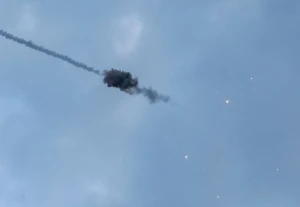
Russia keeps provoking: Ukrainian military tell how ships with grain travel through Black Sea
Ukraine has temporary maritime corridors in the Black Sea that allow it to export grain. The Defense Forces are capable of protecting ships against Russian threats
photo: gettyimages
Operational Command South Natalia Humeniuk told Channel 24 that Ukrainian grain is exported on international ships. These are powerful global companies that are influential players in the global economy.
What keeps Russia from attacking?
The Defense Forces, according to Humeniuk, are capable of organizing a safe passage for exports. This is also influenced by the structure of NATO countries' surveillance of the Black Sea. Several planes and drones fly overhead to observe the situation.
In addition, Russia is significantly deterred by Ukraine's long-range weapons that could threaten its warships. In recent months, the aggressor country's fleet has been regularly visited by naval drones.
Of course, the invading Russian troops are trying to carry out various provocations. For example, they are dropping guided aerial bombs near Zmiinyi Island.
"They want to convince the international community that this sea corridor cannot be safe. But the Defense Forces are working hard and effectively to ensure the security of the humanitarian corridor," emphasized Humeniuk.
Information on the "grain corridor"
On 17 July, Russia announced the termination of the grain deal. In response, Volodymyr Zelenskyy said that it was necessary to continue using the grain corridor despite Russia's withdrawal from the agreement.
On August 4, Secretary of the National Security and Defense Council of Ukraine Oleksiy Danilov said that Ukraine would send ships with its own grain to wherever it deems necessary and would not ask anyone for permission.
On August 10, the Ukrainian Navy announced a temporary humanitarian corridor for merchant ships sailing to and from Ukrainian ports.
On August 12, Ukraine opened the registration of merchant ships and their owners who are ready to use temporary routes to Ukrainian ports in the Black Sea.
On August 16, the first vessel left the port of Odesa after Russia announced that it would terminate the grain deal on July 16, 2023.
On August 25, Ukrainian President Volodymyr Zelenskyy met with Turkish Foreign Minister Hakan Fidan. The politicians discussed, among other things, the grain deal. Fidan stated that Ankara sees "no alternative" to the Black Sea Grain Initiative, the original grain deal that Ukraine and Russia concluded with the mediation of the UN and Turkey.
On August 26, the second vessel left the port of Odesa, and on September 1, two more vessels blocked due to the war left the port of Pivdennyi in the Odesa region.
On September 4, Turkish President Recep Tayyip Erdogan, following a meeting with Russian President Vladimir Putin, expressed hope that an agreement on the Black Sea Grain Initiative would be reached in a short time.
On September 16, the blocked bulk carrier PUMA (Cayman Islands) left the Odesa seaport. The vessel was loaded with 16,000 tons of metal and 14,000 tons of rapeseed.
On the same day, Ukraine’s Infrastructure Minister Oleksandr Kubrakov said that the first civilian ships had confirmed their readiness to use the route to the Chornomorsk port to load almost 20,000 tons of wheat for Africa and Asia.
On September 16, Kubrakov said that after Russia withdrew from the grain deal, the occupiers struck Ukraine's ports 118 times. About a third of the infrastructure was damaged or destroyed.
On Tuesday, September 19, the vessel RESILIENT AFRICA left Odesa's Chornomorsk port via a temporary corridor: it was loaded with 3,000 tons of wheat
- News













































